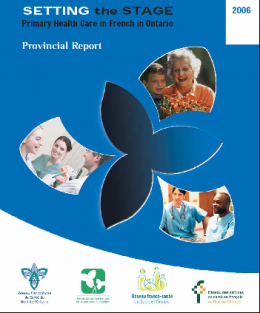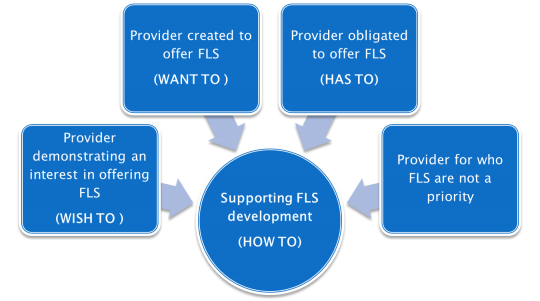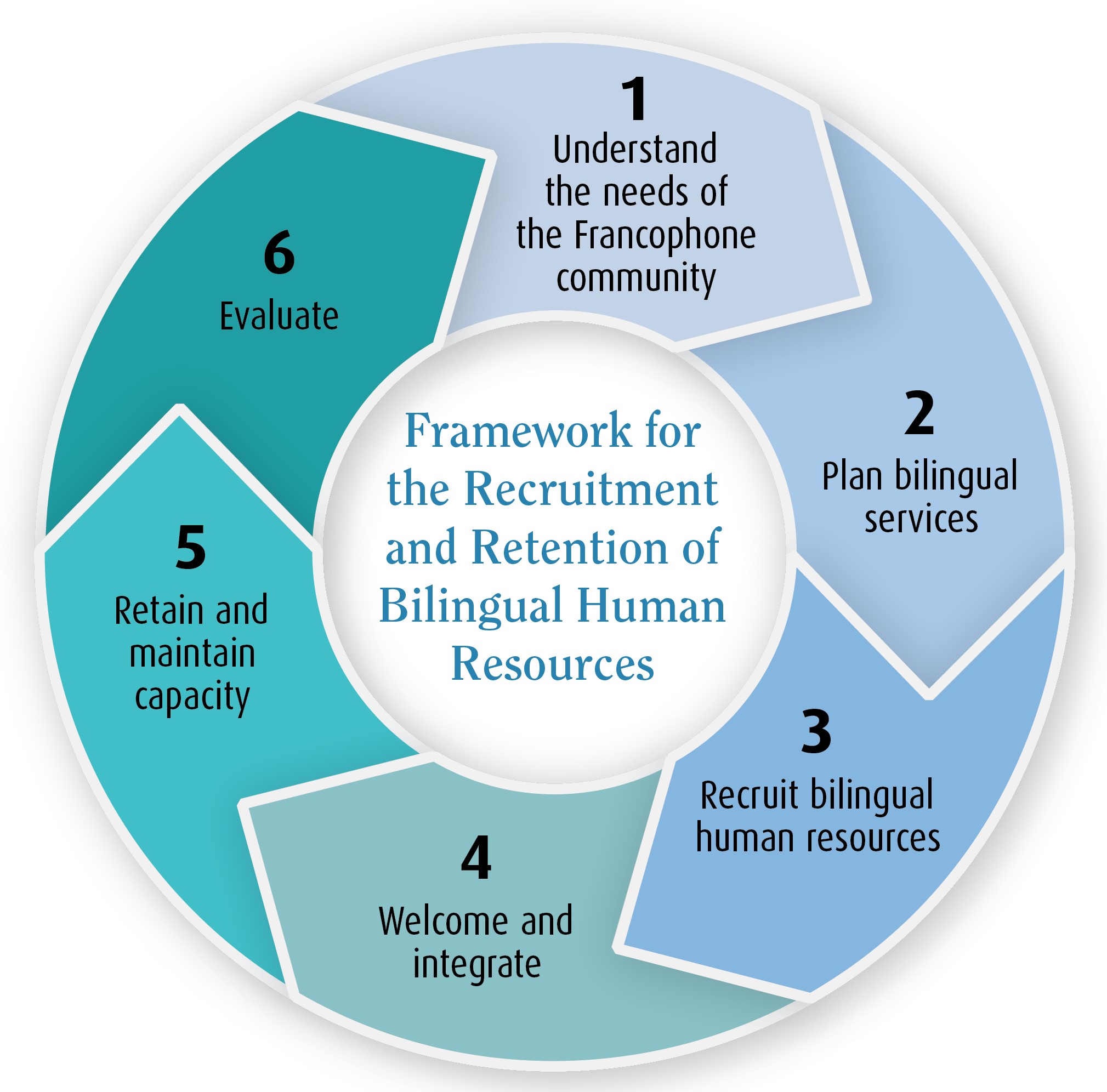2011 Census of Population: Linguistic Characteristics of Canadians
Statistics Canada
2012-2013 Annual Report: A New Approach
Office of the French Language Services Commissioner
This report covers the activities of the Office of the French Language Services Commissioner from April 1, 2012, to March 31, 2013, and provides a review of its last six years. It contains three recommendations for the Ontario government.
6 practical tips for the recrutment & retention of bilingual human resources in the health sector (Spring 2016)
The practical tips offered in this media campaign are base on the Framework for Recruitment & Retention of Bilingual Human Resources in the Health Sector from Société Santé en français et Réseau franco-santé du Sud de l'Ontario, March 2015.

- Best Practices
- Employment/working conditions
- Organizational Level
- Patient Centered
- Professional Level
- Spoken language
Commissariat aux services en français
The French Language Services Commissioner has a mandate to conduct independent investigations under the French Language Services Act, either in response to complaints or on his own initiative, to prepare reports on his investigations, and to monitor the progress made by government agencies in the delivery of French-language services in Ontario.
Consortium national de formation en santé (CNFS)
The CNFS is a Canada-wide umbrella organization bringing together 11 university and college educational institutions which deliver training programs in various health disciplines in French, as well as regional partners who facilitate and promote access to these training programs.
Destination santé 2018: quality, safety and well-being in French. A document that shows strategic axes of the French health for the next five years.
Société santé en français/French only
Differential Glossary of Health Terms
Moncton University
In the Maritime Provinces, doctor-patient communication has become increasingly complicated by the regional varieties of the French language. The purpose of the Les mots pour parler des maux glossary, i.e. ‘Words Used to Talk About Aches and Pains’, is to facilitate the integration of health-care workers who are less familiar with Acadian French and to improve the delivery of health services. - See more at: http://www8.umoncton.ca/umcm-mots-maux/home#sthash.Fxnk78z6.dpuf
Evaluation of the Official Languages Health Contribution Program 2008-2012
Health Canada and the Public Health Agency of Canada, March 2013
The purpose of the Official Languages Health Contribution Program (OLHCP) evaluation was to assess the relevance and performance of the Program in fulfillment of the requirements of the Financial Administration Act and the Treasury Board Policy on Evaluation (2009). The evaluation covered the period from April 2008 to June 2012.
French Language Services Act
The French Language Services Act (1986) (FLSA) guarantees an individual's right to receive services in French from Government of Ontario ministries and agencies in designated areas.
Funding programs
Centre d'information en resources financières (CIRF), Assemblée de la francophonie de l'Ontario /French only
Complete directory of government and private programs and subsidies available nationally and provincially.
Je parle français
Get on the right track to diversity and inclusion!
French speaking people are an invisible minority that are not recognized by a last name alone… Let the French speaker come to you.
Clearly place the focus on your bilingual staff using these simple and effective promotional tools. These posters, pins, and promo items have been proven effective by various Ontario organizations working with Francophone Minority Communities.
The models were enhanced in response to trials and recommendations by customers and users in health care settings.
Increase your staffs’ productivity and reduce patient confusion.
Place your order now!
Promo items prices and order sheet jan2015
- Best Practices
- Health services
- Health Sources
- Organizational Level
- Patient Centered
- Spoken language
- Tools
Jeux du francais medical (French resource)
Médecins francophones du Canada (French resource)
The French physicians of Canada website offers various games to learn appropriate French medical terms to use in different situations. Which terms are acceptable or should be avoided. Very interesting tool for English speaking doctors working with francophone minorities.
L’Assemblée de la francophonie de l’Ontario (AFO)
The Francophone Assembly of Ontario is the umbrella organization and the political voice of the Ontario Francophonie. It advocates the inclusion, cohesion, unity, democracy, equity and respect for diversity and all of the Francophone community in Ontario. It acts as a spokesman and mouthpiece for the francophone community.
Médecins francophones du Canada
Médecins francophones du Canada is engaged in promoting objectives that encourage medical services of a high calibre, with human values, among Francophone physicians, and grouping them into formal and virtual networks, as well as providing them with resources and tools that will support their initiatives and their projects.
Office of Francophone Affairs
Created under the French Language Services Act, the Office of Francophone Affairs works together with the ministries to ensure that the Act is applied. With assistance from the French Language Services Coordinators, it ensures that the public has access to services in French in the 25 designated areas. It also provides information on the province's Francophone population to other levels of government and the public.
Overview of demographic, economic and social profile of the Francophone population of Ontario between 2001 and 2006
Ontario Trillium Foundation
- Health Sources
- Income and social status
- Patient Centered
- Spoken language
- Statistics and Research
- Systemic Level
Portail de formation linguistique et d’adaptation culturelle, en santé
Le Consortium national de formation en santé (CNFS)
Certaines communautés francophones ont leur façon bien à eux de communiquer. Qu'il s'agisse d'un accent particulier, d'un vocabulaire qui s'inspire de leurs origines et de leur histoire ou d'une façon de faire qui les caractérise, il est parfois difficile de les comprendre. Vous trouverez sous la section « Formation d'adaptation culturelle (FAC) » différentes formations ou divers outils permettant de mieux comprendre les variantes linguistiques et culturelles des communautés francophones vivant en situation minoritaire au Canada.
Portrait of Francophones in Ontario following the 2011 census according to the Inclusive Definition of Francophone (IDF)
Office of Francophone Affairs
- Gender
- Health Sources
- Patient Centered
- Social environments
- Spoken language
- Statistics and Research
- Systemic Level
Project 2013-2018
Human resource strategies for sustaining the continuum of care for francophone populations in central, south-west regions of Ontario.
Project Summary:
A Réseau franco-santé du Sud de l’Ontario’s project conducted between January 25th and March 31st, 2013 in partnership with the Rifssso, the four French Language Health Planning Entities (Entities) and the collaboration of the Local Health Integration Networks (LHINs) of the region and with the support of Sultrem Inc. consulting firm.
Expected results:
A collaborative project contributing to increase the knowledge baseline and provide a framework for targeted actions in the area of FLS. Findings and observations are based on front line service provider data captured via surveys and interviews.
Regroupement des intervenantes et intervenants francophones en santé et en services sociaux de l’Ontario (Rifssso)
Le Regroupement des intervenants francophones en santé et en services sociaux de l’Ontario (Rifssso) is a not-for-profit umbrella organization of French-speaking professionals working in the fields of health and social services. Its goal is to develop and support leadership among its members by offering them a variety of activities such as continuing professional development, networking, and so forth. In addition, Rifssso works to raise awareness within government of the challenges facing French-speaking professionals working in these fields.
Setting the stage
Primary Health Care in French in Ontario (2006) Provincial and Regional study
 Setting the Stage is a French language health services planning project. It is a national initiative of the Société Santé en français (SSF) and is funded by Health Canada through the Primary Health Care Transition Fund (Official Language Minority Communities Envelope). Over the past two years, Canada’s 17 French language health networks, including the Réseau franco-santé du Sud de l'Ontario [Franco Health Network
Setting the Stage is a French language health services planning project. It is a national initiative of the Société Santé en français (SSF) and is funded by Health Canada through the Primary Health Care Transition Fund (Official Language Minority Communities Envelope). Over the past two years, Canada’s 17 French language health networks, including the Réseau franco-santé du Sud de l'Ontario [Franco Health Network
of Southern Ontario], have been conducting a study involving both field work and documentary research. The goal of the study was to achieve a better understanding of the health needs, gaps and priorities of Francophone minority communities and to develop potential solutions. One of the project’s concrete deliverables has been all of the information and analyses now available that will facilitate decision making on the best ways of providing quality health care services to the Francophone population.
[prettyfilelist type="pdf" filesPerPage="10"]
- Best Practices
- Health services
- Health Sources
- Professional Level
- Spoken language
- Statistics and Research
- Systemic Level
Study – The evolution of English-French bilingualism in Canada from 1961 to 2011
Statistics Canada, May 2013
Research and Statistics on trends in bilingualism in Canada. Identification of factors that may explain the recent stagnation of bilingualism across the country since 2011.
The French presence in Ontario – Infographic illustration
Office of the French Language Services Commissioner
Infographic which illustrates the French presence in Ontario using the census of population 2011.
THE IMPACT OF LANGUAGE BARRIERS ON PATIENT SAFETY AND QUALITY OF CARE
Final Report

Prepared by: Sarah Bowen, PhD
For: Société Santé en français
August, 2015.
KEY POINTS
1. Significant research has been conducted on the impact of language barriers on health and healthcare, particularly over the past two decades. This research, (and several sys-tematic and critical reviews) has provided compelling evidence of the negative impact of language barriers on healthcare access, patient satisfaction and experience, as well as disparities in receipt of care between English (dominant language) proficient patients and those facing language barriers.
2. Those facing language barriers also face increased risk of medication errors and com-plications, and adverse events. The rights of limited English proficient patients to in-formed consent and confidentiality are often not protected.
3. The research on language access does not align that well with the healthcare quality and safety literature; and not all applicable research is published in commonly-cited medical journals. This may contribute to low awareness of the risks of language barriers among providers and managers.
4. Due to data limitations, limited research on impacts of language barriers has been con-ducted in the Canadian setting. However, a review of the pathways through which lan-guage barriers impact quality of care and safety indicates that much of the international research is applicable in the Canadian context.
5. In contrast to the evidence of negative impacts of language barriers on quality of care (including risk of adverse events), there is not evidence of disparities in mortality be-tween English proficient patients and those facing language barriers. This finding is not unexpected, given what is known about the pathways by which language barriers affect care quality, and limitations of methods used to investigate the impact of language barri-ers on health outcomes.
6. There are several barriers to action in addressing the risks of language barriers to quali-ty of care and patient safety: lack of awareness of current research; gaps in Canadian research; lack of language coding in Canadian data; historical framing of linguistic ac-cess as an issue of cultural sensitivity (rather than patient safety); and failure to ade-quately “translate” available evidence into healthcare action.
7. Recent research has begun to outline the complexity of pathways by which language, culture, race/ethnicity and health literacy may affect patient care.
8. Current approaches to addressing the risks of language barriers rely on the dedication and insight of individual providers rather than implementation of effective, evidence-informed strategies at the system level. This is not acceptable in light of current knowledge of effective approaches to patient safety.
9. Implications of available evidence for future research, for the SSF, and for the patient safety movement are discussed.
- Health services
- Health Sources
- Organizational Level
- Patient Centered
- Personal health practices and coping skills
- Professional Level
- Spoken language
- Statistics and Research
The Tool Box for French Services (French only)
Consortium national de formation en santé (CNFS)
Groupe de recherche et d'innovation sur l'organisation des services de santé (GRIOSS)
Facilitating the acquisition of knowledge and skills leading to the active offer of French language health services, this toolkit has two objectives: educate Francophone health professionals about the importance and scope of their role and help them to integrate more French active offer in their practice in order to provide quality, safe, ethical and fair health care services.
VIDEOS ON THE ACTIVE OFFER OF FRENCH LANGUAGE HEALTH SERVICES
Le Réseau du mieux-être francophone du Nord de l’Ontario (RMEFNO)
This new tool, created with funding from Health Canada through an important partnership with Société Santé en français, is designed primarily for health care professionals and providers. It aims to raise awareness regarding the importance of proactively offering quality services in French to health care recipients.
Active Offer Introduction from Shebafilms Kelly Saxberg on Vimeo.
- Health services
- Health Sources
- Organizational Level
- Patient Centered
- Professional Level
- Spoken language
Visual census of official languages spoken in various Canadian cities, 2011 Census
Health Human Resources Strategy
The concepts and courses of action presented here are aimed at increasing French language health services across Canada. This online resource provides a framework for recruitment and retention of bilingual human resources in the context of health services for a minority population.






